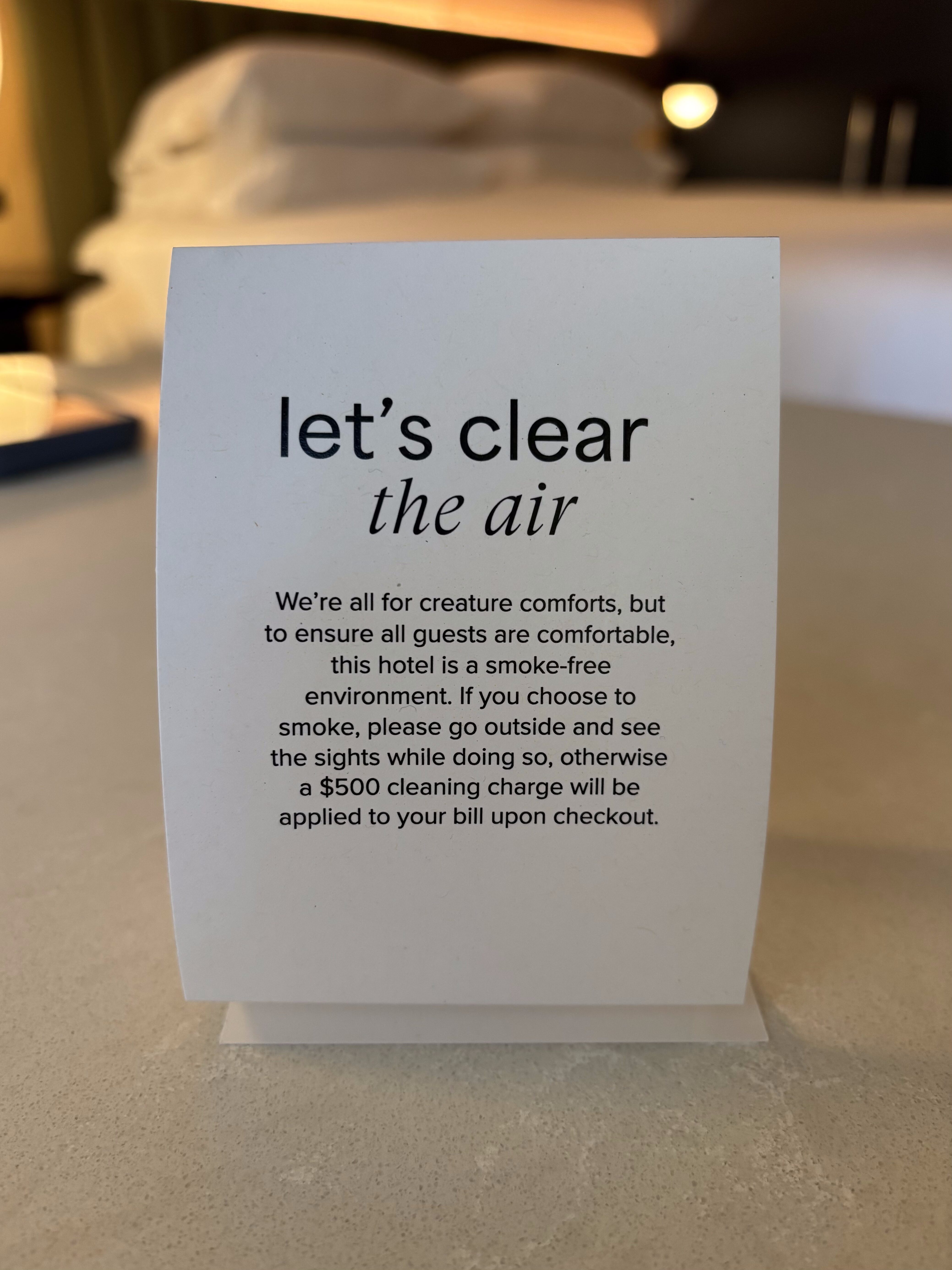Hotels have devised numerous ways to generate additional revenue from guests. Whether it’s charging for regular Wi-Fi and offering “premium” access for a fee, tacking on excessive parking charges, or adding “amenities fees” that no one actually wants, these junk fees are nothing new.
Before the pandemic, one of the more annoying ones was the dreaded mystery mini-bar charge that would show up after you checked out. However, as mini-bars have become less common, it appears that some hotels have found a new way to boost revenue—by charging smoking fees, backed by high-tech sensors.
What We Discovered While Researching a Hotel Stay
When looking at hotels for a recent trip to New York, I came across the Kimpton Theta. While the hotel looked promising, the most frequent complaint on TripAdvisor wasn’t about noise, location, or cleanliness—it was about surprise $500 charges for smoking in the room. That caught my attention.
Digging deeper, I found that the hotel is very upfront about its policy. Right on their website, there’s this disclaimer:

Sensor-Driven Charges, No Real-Time Warnings
According to the notice, every room is equipped with a device from Rest Sensor that detects tobacco, vape, e-cigarette, or marijuana smoke. What’s interesting is that the sensor doesn’t notify you at the time it detects something—it just flags it, and a $500 charge is added to your bill after checkout.
Some TripAdvisor reviewers were adamant they hadn’t smoked, yet still got charged. As non-smokers ourselves, we were a little concerned about the possibility of a false positive.
We Reached Out to the Hotel—Here’s What They Said
To clarify, we contacted the hotel management before booking. The Senior Operations Manager responded with this:
I completely understand your concerns regarding smoking charges. As a smoke-free hotel, we prohibit all forms of smoking and vaping indoors to ensure a comfortable environment for all our guests. To help deter smoking, we have air-quality monitoring devices in our rooms that can detect smoking or vaping activity. That said, we review each situation individually and would never apply a charge without verifying clear evidence. If neither of you smoke or vape, you can be confident that you won’t receive any unexpected fees.
I know online reviews can sometimes raise concerns, and while I can’t speak to every situation mentioned, I can assure you that we are fair and transparent in how we handle this policy. Our goal is always to provide a seamless and enjoyable stay for our guests.
When checking in, I’m almost positive that the fee was mentioned, and I had to initial that I was told of the policy. We also noticed signage in the room about the smoking sensors:

We’re pleased to report that there were no unexpected charges on our folio when we checked out.
So, What Is Rest Sensor?
Curious, I looked into the company behind the technology. Rest Sensor is marketed to hotels as a way to enforce no-smoking policies and—this part is key—generate extra revenue.

Their website boasts a potential 84x increase in smoking-related fee revenue, with hotels generating up to $1,200 in extra income per room annually. The company’s sales pitch to hotel operators even includes the phrase:

They’re not just selling smoke detection—they’re selling profitability.
Is This the New Mini-Bar Charge?
As a non-smoker, I totally get why hotels would want to enforce their policies. I’ve stayed in rooms that reeked of smoke, and no amount of air freshener fully removes that smell. If a guest breaks the rules, there should be consequences.
What concerns me is the risk of being falsely flagged. This isn’t a $9 mini-bar soda you can dispute with a quick call. It’s $500. And if the hotel believes the sensor “detected” something, will they budge? Or will this turn into a drawn-out customer service nightmare?
Final Thought
This is a relatively new development in hotel tech, and only time will tell how widespread these sensors become—or how accurate they are. If you’re a non-smoker, this might never affect you. But the idea that a hidden sensor could silently charge you $500 is… unsettling. For now, we’ll keep our eyes (and noses) open—and maybe bring a personal air-quality monitor next time, just in case.
Want to comment on this post? Great! Read this first to help ensure it gets approved.
Want to sponsor a post, write something for Your Mileage May Vary, or put ads on our site? Click here for more info.
Like this post? Please share it! We have plenty more just like it and would love it if you decided to hang around and sign up to get emailed notifications of when we post.
Whether you’ve read our articles before or this is the first time you’re stopping by, we’re really glad you’re here and hope you come back to visit again!
This post first appeared on Your Mileage May Vary

2 comments
I would be concerned that it could detect something that is not smoke, such as smell from a pizza or some other cooked food.
The H Hotel at LAX charges a $10.72+ daily fee for security for their employees.. I asked the employees what that meant for them?? extra security guards, special safe parking.?? They said they did not know?? SO just an extra tax on their clients!!!!!!!!!!!!!!!!!